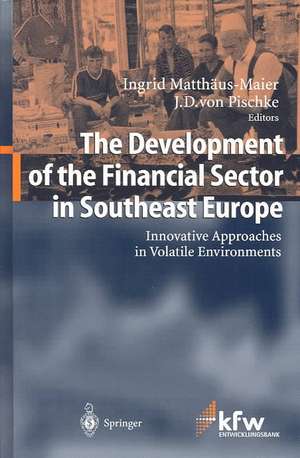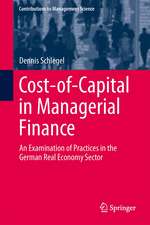The Development of the Financial Sector in Southeast Europe: Innovative Approaches in Volatile Environments
Editat de Ingrid Matthäus-Maier, J. D. Pischkeen Limba Engleză Hardback – 7 noi 2003
| Toate formatele și edițiile | Preț | Express |
|---|---|---|
| Paperback (1) | 386.61 lei 6-8 săpt. | |
| Springer Berlin, Heidelberg – 30 noi 2010 | 386.61 lei 6-8 săpt. | |
| Hardback (1) | 393.90 lei 6-8 săpt. | |
| Springer Berlin, Heidelberg – 7 noi 2003 | 393.90 lei 6-8 săpt. |
Preț: 393.90 lei
Nou
Puncte Express: 591
Preț estimativ în valută:
75.37€ • 78.70$ • 62.24£
75.37€ • 78.70$ • 62.24£
Carte tipărită la comandă
Livrare economică 15-29 aprilie
Preluare comenzi: 021 569.72.76
Specificații
ISBN-13: 9783540203278
ISBN-10: 3540203273
Pagini: 268
Ilustrații: XVII, 246 p.
Dimensiuni: 155 x 235 x 20 mm
Greutate: 0.55 kg
Ediția:2004
Editura: Springer Berlin, Heidelberg
Colecția Springer
Locul publicării:Berlin, Heidelberg, Germany
ISBN-10: 3540203273
Pagini: 268
Ilustrații: XVII, 246 p.
Dimensiuni: 155 x 235 x 20 mm
Greutate: 0.55 kg
Ediția:2004
Editura: Springer Berlin, Heidelberg
Colecția Springer
Locul publicării:Berlin, Heidelberg, Germany
Public țintă
Professional/practitionerCuprins
1: Introduction.- I: The Evolution of Financial Sector and Economic Development in Southeast Europe.- 2: The Financial Sector and Economic Development: Evidence from Southeast Europe.- II: Innovative Approaches to Building Financial Sectors in Southeast Europe.- 3: Competition and Complementarity: KfW’s Approach to Financial Sector Development in Southeast Europe.- 4: Providing Long-Term Funds to Local Financial Institutions — The European Refinancing Funds in Southeast Europe.- 5: Strengthening Financial Sectors in Transition Countries: IFC’s Contribution.- 6: EBRD’s Micro and Small Enterprise Lending Programmes: Downscaling Commercial Banks and Starting Greenfield Banks.- 7: Surviving the Crisis: Microfinance in Bolivia, 1999–2002.- 8: Institutional Development and Commercialisation — Optimal Exit for Equity Financiers.- III: Pioneering Banks and Bankers in Southeast Europe.- 9: Market Entry in Southeast Europe — Raiffeisenbank Belgrade.- 10: Sustainable Microfinance Banks — Problems and Perspectives.- 11: Equity Participation in Microfinance Banks in Southeast Europe and Georgia — A Strategic Option for a Large Private German Bank?.- IV: Research and Impact Analysis for Accountability and Management.- 12: The Contribution of Science and Research to the Development of Microfinance.- 13: Best Practice Principles for Microfinance Impact Analysis.- 14: Enterprise Level Impacts of Financial Sector Projects in Southeast Europe.- 15: Impact of Financial Sector Projects in Southeast Europe — Effects on Financial Institutions and the Financial Sector.- V: Summary and Conclusion.- 16: Summary and Conclusion.- Index of Names.- Index of Countries.- Index of Banks and Organisations.- Index of Terms.
Recenzii
From the reviews:
"This book focuses on the development of the financial sector in Southeast Europe in order to foster growth with equity and highlights a number of institutional and other innovations and related challenges in the creation and promotion of sustainable micro-finance institutions … . makes a very valuable contribution to sharing important experiences of how to foster financial sector development in transitioning countries. It is a must-read, or … a want-to-read book for the staff of government and donor organizations, commercial banks, micro-finance practitioners … ." (Manfred Zeller, Quarterly Journal of International Agriculture, Vol. 44 (2), 2005)
"This book focuses on the development of the financial sector in Southeast Europe in order to foster growth with equity and highlights a number of institutional and other innovations and related challenges in the creation and promotion of sustainable micro-finance institutions … . makes a very valuable contribution to sharing important experiences of how to foster financial sector development in transitioning countries. It is a must-read, or … a want-to-read book for the staff of government and donor organizations, commercial banks, micro-finance practitioners … ." (Manfred Zeller, Quarterly Journal of International Agriculture, Vol. 44 (2), 2005)
Textul de pe ultima copertă
KfW has been assigned responsibility by the German government and several other donors for projects designed to reconstruct the financial landscapes of Southeast Europe. These activities are recognized as quite successful in building sustainable financial institutions that serve the small end of the market, with special emphasis on microenterprise and small business. The KfW-managed projects have contributed to the overall stability of financial sectors and to economic recovery and growth through employment creation and investment. This book reviews experience gained and analyses the reasons for the successes achieved, options for further improvement, and scope for replicability in other transition and developing economies. A particularly interesting feature is that relatively small amounts of public funds can catalyse financial markets in volatile environments.
Caracteristici
Comprehensive report on the experiences of reconstructing the financial sector in Southeast Europe, especially for small enterprises Thorough account of public donors' work First publication of this kind dealing with Southeast Europe Includes supplementary material: sn.pub/extras













